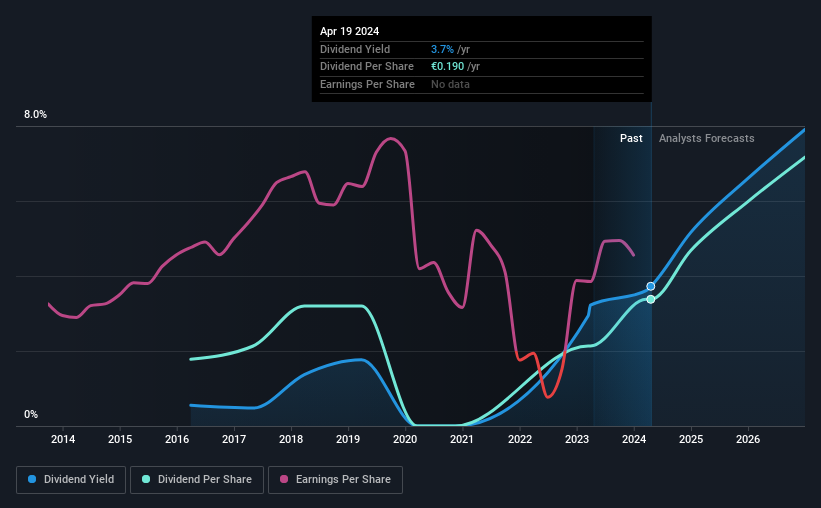Multitude (ETR:FRU) Has Announced That It Will Be Increasing Its Dividend To €0.19
The board of Multitude SE (ETR:FRU) has announced that it will be paying its dividend of €0.19 on the 7th of May, an increased payment from last year's comparable dividend. This will take the dividend yield to an attractive 3.7%, providing a nice boost to shareholder returns.
See our latest analysis for Multitude
Multitude's Dividend Is Well Covered By Earnings
If the payments aren't sustainable, a high yield for a few years won't matter that much. However, prior to this announcement, Multitude's dividend was comfortably covered by both cash flow and earnings. This means that most of what the business earns is being used to help it grow.
Looking forward, earnings per share is forecast to rise by 133.2% over the next year. If the dividend continues on this path, the payout ratio could be 17% by next year, which we think can be pretty sustainable going forward.
Multitude's Dividend Has Lacked Consistency
Even in its relatively short history, the company has reduced the dividend at least once. This suggests that the dividend might not be the most reliable. The annual payment during the last 8 years was €0.10 in 2016, and the most recent fiscal year payment was €0.19. This means that it has been growing its distributions at 8.4% per annum over that time. It's good to see the dividend growing at a decent rate, but the dividend has been cut at least once in the past. Multitude might have put its house in order since then, but we remain cautious.
Dividend Growth Potential Is Shaky
With a relatively unstable dividend, it's even more important to evaluate if earnings per share is growing, which could point to a growing dividend in the future. Multitude's earnings per share has shrunk at 11% a year over the past five years. A sharp decline in earnings per share is not great from from a dividend perspective. Even conservative payout ratios can come under pressure if earnings fall far enough. It's not all bad news though, as the earnings are predicted to rise over the next 12 months - we would just be a bit cautious until this becomes a long term trend.
Our Thoughts On Multitude's Dividend
Overall, we always like to see the dividend being raised, but we don't think Multitude will make a great income stock. In the past, the payments have been unstable, but over the short term the dividend could be reliable, with the company generating enough cash to cover it. We would probably look elsewhere for an income investment.
Market movements attest to how highly valued a consistent dividend policy is compared to one which is more unpredictable. Meanwhile, despite the importance of dividend payments, they are not the only factors our readers should know when assessing a company. Taking the debate a bit further, we've identified 1 warning sign for Multitude that investors need to be conscious of moving forward. If you are a dividend investor, you might also want to look at our curated list of high yield dividend stocks.
Have feedback on this article? Concerned about the content? Get in touch with us directly. Alternatively, email editorial-team (at) simplywallst.com.
This article by Simply Wall St is general in nature. We provide commentary based on historical data and analyst forecasts only using an unbiased methodology and our articles are not intended to be financial advice. It does not constitute a recommendation to buy or sell any stock, and does not take account of your objectives, or your financial situation. We aim to bring you long-term focused analysis driven by fundamental data. Note that our analysis may not factor in the latest price-sensitive company announcements or qualitative material. Simply Wall St has no position in any stocks mentioned.

 Yahoo Finance
Yahoo Finance 
